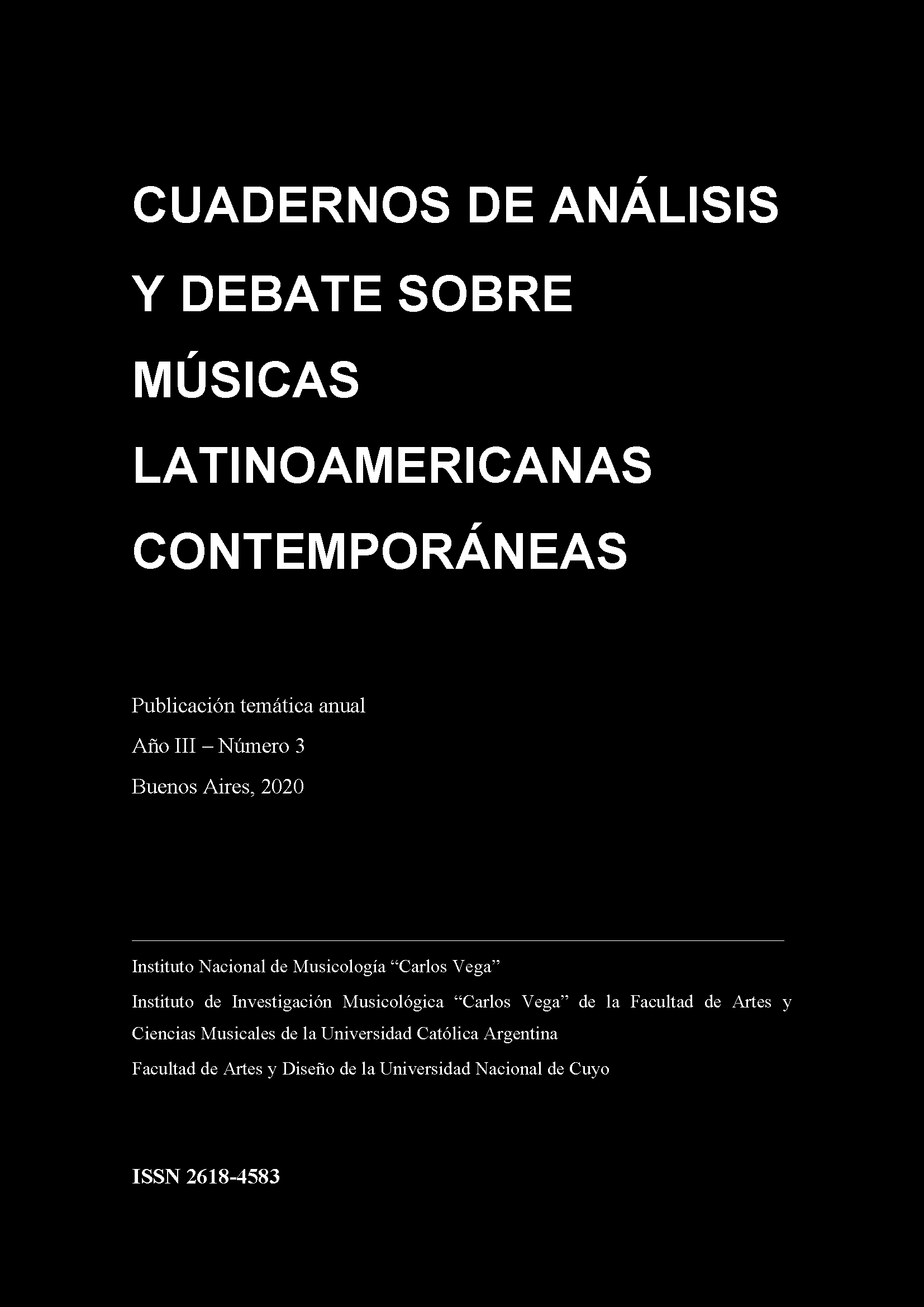El tiempo tardío en exótica de Juan Campoverde
Keywords:
temporalities, late capitalism, nation, partial connectionsAbstract
The analysis of Juan Campoverde's work, exotic, focuses on the theme of the end of the nation as a priority, and moves towards what is called a certain historical nihilism. It shows the appearance of diverse temporalities in the work that would correspond with similar historical drifts, in such a way that we would be listening to those typical sequences of the times of late capitalism that the work expresses critically. Thus, it shows how late time passes without passing, stopped in the endless present of capitalism. In the face of this, we find in Campoverde an untimely time that is expressed in the temporal structures of the work.
Downloads
References
Adorno, T. (2003). Filosofía de la nueva música. Madrid: Akal.
Bensaid, D. (2009). Marx intempestivo. Buenos Aires : Herramienta.
Bhabha, H. (1994). El lugar de la cultura. Buenos Aires : Manantial.
Born, G., Lewis, E., & Straw, W. (. (2017). Social Aesthetics. Durham: Duke University Press.
Bulent, D. (2009). Nihilism. London: Routledge.
Bustos, G. (2017). El culto a la nación. México: FCE.
Campoverde, J. (2017). exótica. Chicago, Estados Unidos.
Campoverde, J. (2017). exótica . Partitura exótica. Chicago.
Cunningham, C. (2002). Genealogy of Nihilism . London : Routledge.
Deleuze, G., & Guattari, F. (1991). ¿Qué es la filosofía? Barcelona : Anagrama.
Derrida, J. (1997). La diseminación . Madrid : Fundamentos.
Echeverría, B. (2011). Imágenes de la "blanquitud". En B. Echeverría, Antología.
Crítica de la modernidad capitalista (págs. 145-160). La Paz: Oxfam/Vicepresidencia del Estado Bolivia.
Eco, U. (1987). Lector in fabula. Barcelona: Lumen.
Eco, U. (1992). Los límites de la interpretación. Barcelona: Lumen.
Encalada, D. (2014). El virtuosismo conceptual de Aires. Consideraciones sobre el proceso interpretativo. Tsantsa, 1-4.
Gracyk, T., & Kania, A. (2011). The Routledge Companion to Philosophy and Music. London : Routledge.
Hjelmslev, L. (1980). Prolegómenos a una teoría del lenguaje. Madrid: Gredos.
Jameson, F. (1995). El posmodernismo o la lógica cultural del capitalismo avanzado. Barcelona: Paidós.
Lakatos, I. (1983). La metodología de los programas de investigación . Madrid: Alianza Editorial.
Mandel, E. (1979). El capitalismo tardío. México: Era.
Menezes, F. (s.f.). Transgresso e Intertensão.
Nishida, K. (2016). La lógica del lugar. En Heisig, Kasulis, Maraldo, & Bouso, La filosofía janponsea en sus textos (págs. 673-694). Barcelona: Herder.
Nussbaum, C. O. (2007). The Musical Representation. Cambridge, MA: MIT Press. Ospina, P. (2020). La aleación inestable . Quito : Teseo/UASB.
Peirce, C. S. (1973). La ciencia de la semiótica. Buenos Aires : Nueva Visión.
Rojas, C. (2011). Estéticas caníbales. Volumen 1. Cuenca: Universidad de Cuenca/Bienal Internacional de Cuenca.
Rojas, C. (2017). Estéticas caníbales. Máquinas formales abstractas (Vol. 2). Cuenca: Universidad de Cuenca.
Rojas, C. (2018). Estéticas Caníbales. Vol. 3. Del ethos barroco al ethos caníbal. (Vol.3). Cuenca: Universidad de Cuenca.
Rojas, C., & Rojas, N. (2019). Dialéctica de las Abstracciones. Cuenca: Universidad de Cuenca.
Schurmann, R. (2003). The broken hegemonies. Bloomington, In.: Indiana University Press.
Sjöstedt-H, P. (2015). Neo-nihilism. Amazon Digital Editions.
Spivak, G. (2017). Una educación estética en la era de la globalización . México: Siglo XXI.
Strathern, M. (2004). Partial conecctions. Oxford: Altamira Press.
Vizzardelli, S. (2015). Filosofía della Música. Roma: Laterza.
Weil, S. (1994). La gravedad y la gracia. Madrid: Trotta.
Downloads
Published
How to Cite
Issue
Section
License
Copyright (c) 2021 Carlos Rojas Reyes

This work is licensed under a Creative Commons Attribution-NonCommercial-ShareAlike 4.0 International License.







